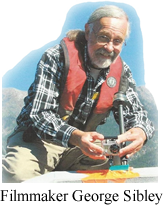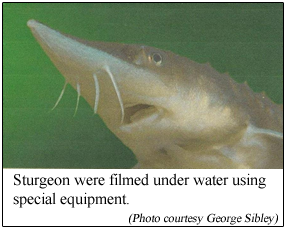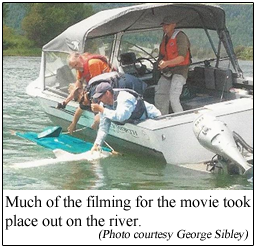|
Boundary County residents
are well aware of the ongoing effort over recent
years to restore the population of the Kootenai
River's signature fish, the white sturgeon.
Now, a movie shot largely
in Boundary County is telling the story to the
world.
 The
movie, The Fish Between the Falls, was
produced by filmmaker George Sibley, who has
made several movies about our region.
In telling the story of the white
sturgeon of the Kootenai, about 40% of the river
scenes in the movie were filmed in Boundary
County, the remainder filmed in Montana and in
British Columbia's Kootenay Lake. The
movie, The Fish Between the Falls, was
produced by filmmaker George Sibley, who has
made several movies about our region.
In telling the story of the white
sturgeon of the Kootenai, about 40% of the river
scenes in the movie were filmed in Boundary
County, the remainder filmed in Montana and in
British Columbia's Kootenay Lake.
Mr. Sibley's movie will
have its Boundary County premier next Friday,
March 20, at the Boundary County Museum.
The movie will also be shown at towns up
and down the Kootenai River in Montana and
Canada on other dates, and later in Coeur
d'Alene.
Efforts to restore sturgeon
population documented in movie
The once abundant white
sturgeon of the Kootenai
River constituted a valuable social,
economic, and sustenance fishery for many
generations for the Kootenai Tribe and later for
others who settled in the area.
For a variety of reasons, sturgeon
populations went into marked decline beginning
around the middle of the last century.
The Kootenai Tribe began
their original hatchery program in 1989, with
initial efforts directed toward conservation of
the Kootenai River's white sturgeon.
The
Kootenai River sturgeon were eventually
designated as "Endangered" in 1994, under the
provisions of the Endangered Species Act.
Partnering with several
other organizations, including the U.S. Fish and
Wildlife Service, the Kootenai Valley Resource Initiative, the Idaho Department of
Fish and Game, the University of Idaho's
Aquaculture Research Institute, the Bonneville
Power Administration, the British Columbia
Ministry of Environment, along with other
stakeholders, the Tribe's aquaculture program
dedicated toward conservation of the Kootenai
River white sturgeon (along with the river's
burbot population) has met with significant
success over the years.
Resource Initiative, the Idaho Department of
Fish and Game, the University of Idaho's
Aquaculture Research Institute, the Bonneville
Power Administration, the British Columbia
Ministry of Environment, along with other
stakeholders, the Tribe's aquaculture program
dedicated toward conservation of the Kootenai
River white sturgeon (along with the river's
burbot population) has met with significant
success over the years.
Capturing that success
story was the goal for Mr. Sibley, and putting
the story on film makes the ongoing efforts to
boost the sturgeon population a great cinematic
narrative.
Making the movie
Mr. Sibley, who grew up in
Massachusetts but now lives in Florida, says it
took over two years to make the movie, starting
back in 2013, making trips to the Kootenai
usually in the spring and fall seasons of the
year, in order to shoot the processes and scenes
that make up sturgeon aquaculture and efforts to
re-introduce the fish into the river.
"My wife and I have been
coming out this way since the 1980's, because we
love the scenery and the history and the people
here," said Mr. Sibley.
"When I
started making independent films, I wanted to
concentrate on subjects that interested me, but
which I felt were not getting enough attention
from the mainstream media, and if I could find
those subjects in an area I also liked to be in,
so much the better."
Besides the Kootenai River
and Boundary County, other filming locales for
The Fish Between the Falls included
Massachusetts, California, Spokane, and other
areas.
Filming in these more distant locations
was necessary because of research centers in
those areas that are studying sturgeon and
helping to develop the science of restoring the
sturgeon population in the Kootenai.
"As you will see in the
film, this is a project that is not just about
working in the river.
What happens there is shaped by people in
laboratories and offices and engineering
cubicles in Massachusetts and California, in
Spokane and in Kalispell, and I filmed in all
those places too," said Mr. Sibley.
What is it like making a
movie about sturgeon, and filming in this area?
"Filming animals is always
a difficult job, but that job is even harder
when the animals to be filmed are fish," says
Mr. Sibley.
White sturgeon are the largest and one
of the oldest fish in North America. Kootenai
River white sturgeon are a special population of
these special fish, found only in the Kootenai
River flowing through northern Montana and the
panhandle of Idaho and up into British Columbia. says
Mr. Sibley.
White sturgeon are the largest and one
of the oldest fish in North America. Kootenai
River white sturgeon are a special population of
these special fish, found only in the Kootenai
River flowing through northern Montana and the
panhandle of Idaho and up into British Columbia.
Big fish, small boat.
That was one of the biggest filming
problems of producing a film about the
endangered population of Kootenai River white
sturgeon.
Mr. Sibley
used fixed cameras occasionally to film fishing
activities, but often worked right beside the
crew, in a tricky dance between him and fishers
in order to get dramatic shots for the movie
without capsizing the boat.
Areas around the U.S. and Canada
also involved
Experts across the United
States and Canada are part of the Kootenai River
Sturgeon Recovery Team, and many of these
experts from coast to coast shared their stories
for the movie. On
the east coast, for example, Sibley documented
work by Dr. Boyd Kynard of the University of
Massachusetts at Amherst, who probably is the
world’s expert on the early life stages of
sturgeon, in his experiments to determine what
size rocks the free embryos of Kootenai River
white sturgeon prefer. Then, out on the west
coast, Sibley filmed genetic researchers at the
University of California-Davis for the movie.
Sibley traveled through
time as well, in a sense, recreating the early
Kootenai River as it might have looked at the
end of the Ice Age 10,000 years ago.
Boundary
County movie making can be challenging
Making a movie in Boundary
County has its own challenges, including
challenges not usually found in Hollywood movie
making.
For example, Kokanee salmon
are an important part of the food chain for
sturgeon. As bears are also after Kokanee,
assistants had to keep a watchful eye out for
bears wandering nearby during filming.
The environment of rivers
and streams can also present a challenge.
Viking Diving Equipment contributed protective
gear to allow Sibley to film in cold rivers and
streams, and to get up close and personal with
his aquatic subjects. Sibley also rigged his
camera to a special pole, carrying his lens
closer to the fish in a less threatening way.
After
spending a lot of time in Boundary County over
the years, and making this and a few other
movies about our region, Mr. Sibley has come to
enjoy our area.
"I like the place a lot," he said, "and
parts of my previous two films, about the fur
trader and map-maker David Thompson and about
the big fires of 1910, were also shot here.
It's a great place for history, and also,
with this film, for science."
One of the biggest river
and fish restoration projects ever attempted is
happening right in our own Boundary County
backyard. This film, The Fish Between the
Falls, is telling its story to the world.
Some final details
The Fish Between The
Falls is a Gale Force Films Production with
narration, photography and editing by George
Sibley. Previous films produced by Sibley are
Shadows of David Thompson in 2008,
Ordeal by Fire in 2010 (about the 1910
forest fires), and The River of the West
Driving Tour about the International
Selkirk Loop.
The Fish Between The
Falls will have its Bonners Ferry premier
on Friday, March 20 at 7:00 p.m. at the Boundary
County Museum, 7229 Main Street, Bonners Ferry,
Idaho. Donations, to help support this program
in the Museum, will be accepted at the door.
Other films by George
Sibley are sold in museums around the area, and
are also available for purchase as DVDs or as
downloads from Amazon.com.
To see the full, official
poster about this upcoming movie,
click here.
|

